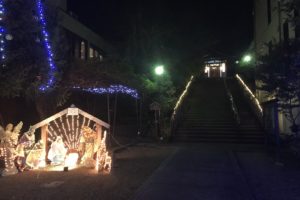7th Sunday after Pentecost, Proper 9
Mark 6:1-13, July 7, 2024
Rev. Misa Furumoto
This year we have been reading from the Gospel
of Mark. So far Jesus has performed many miracles, including healings, casting
out demons, calming storms, and in the passage just before today’s reading,
healing a woman who had been bleeding for years and raising Jairus’ daughter
who was already dead. In addition to miracles, Jesus introduced various
parables to teach people about the Kingdom of God. Jesus’ ministry of
proclaiming the gospel was quite successful, although he had a few disputes
with religious leaders here and there.
Today’s passage surprises us a bit because it
is the story of Jesus being rejected by the people of his hometown. Don’t we
think that those who know Jesus best should be the first to follow him? They
were not. Why not? A similar story is told in Mark 1:21-28. There, Jesus taught
on the Sabbath in the synagogue in Capernaum (a town northwest of Lake
Galilee). All who heard Jesus’ words were simply amazed, for they had never
heard such teaching with authority before. The people also witnessed Jesus
casting out unclean spirits there and spread the word about Him throughout
Galilee.
Now let’s look again at today’s passage. Jesus
came to his hometown, and his disciples followed him. On the Sabbath, Jesus
began to teach in the synagogue. Yes, the people there were as amazed as those
in Capernaum, but for a different reason. They were not surprised at the
content of Jesus’ teaching but were shocked by the fact that the man speaking
before them was that Jesus whom they knew so well. They said, “Where did this
man get all this? What is this wisdom that has been given to him? What deeds of
power are being done by his hands? Is not this the carpenter, the son of Mary,
the brother of Jacob and James and Joses and Judas and Simon, and are not his
sisters here with us?” And they took offense at him.
What does this mean? They were so preoccupied
with their preconceived notions that they could not get the content of Jesus’
teaching into their heads. The much information they had about Jesus blocked
the ears of their minds before they could try to understand what He was trying
to say. “Is he not the son of Mary, the carpenter who is the brother of
these men?” This line tells us that Jesus was not thought of very well by
the people in his hometown. First, a carpenter was a local craftsman who made
furniture, door frames, and other woodwork, rather than building entire houses.
The carpenter’s family was by no means poor, but no doubt it was lower class,
far below the educated class whose children went to school to learn the Torah.
Second, Jesus is referred to here as “son of Mary,” not “son of
Joseph.” This may have been another insult by the crowd. Rumors must have
been spreading in the village that Joseph was not his real father. They said,
“Where did this man get all this?” These words seem to contain a nuance
that Jesus must not be the son of Joseph the carpenter.
At any rate, so much knowledge and information
about the human person of Jesus had blocked people’s ears that they could no
longer hear the most important word of God. One can only imagine how sad this
must have been for Jesus, both as a human being and as God. Indeed, they were
his family, his relatives, his neighbors, the people he had grown up with.
Jesus expressed this feeling of grief as follows. Prophets are not without
honor, except in their hometown, and among their own kin, and their own house.”
And it is said, “he could do no deed of power there, except that he laid his
hands on a few sick people and cured them. And he was amazed at their unbelief.”
Of course, he couldn’t do miracles there because no one believed that Jesus
could do it.
This is not just an event that happened 2,000
years ago, but it still conveys an important message to us today. We, too, may
be misled by various information and miss the most important message from God. We
tend to think, that person must be lying, that person must be trying to take
advantage of me, and so on. Or we often think that that country is really bad,
or this religion is suspicious. In this day and age of news that may or may not
be true, it is natural to be skeptical first, and this is important to avoid
danger. However, it is precisely because we are in such a time that I would
like to remember the preciousness of “belief” with my heart as pure
as a child’s. God’s voice can be heard only when we stop our thinking and let
our hearts be still. When we have ears to listen and respond to that voice,
miracles happen.
In the name of the Father, of the Son, and of the Holy Spirit, Amen.














